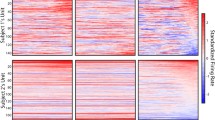Abstract
Biological control systems have long been studied as possible inspiration for the construction of robotic controllers. In this paper, we present a control of voluntary movements using a cortical network within constraints from neurophysiology. Neural controller is proposed to control desired joint trajectories for multi-joint opponent muscle control of a robot finger. Each joint is controlled by an agonist-antagonist muscle pair. Neural model proposes functional roles for pre-central cortical cell types in the computation of a descending command to spinal alpha and gamma motoneurons. Neurons in anterior area 5 are proposed to compute the position of the link in question using corollary discharges and feedback from muscles spindles. Neurons in posterior area 5 use this position perception to compute a desired movement direction. Through experimental results, we showed that neural controller exhibits key kinematic properties of human movements, dynamics compensation and including asymmetric bell-shaped velocity profiles. Neural controller suggests how the brain may set automatic and volitional gating mechanisms to vary the balance of static and dynamic feedback information to guide the movement command and to compensate for external forces.
Preview
Unable to display preview. Download preview PDF.
Similar content being viewed by others
References
García-Córdova, F., Guerrero-González, A., Pedreño-Molina, J.L., Calabozo-Morán, J.: Emulation of the Animal Muscular Actuation System in an Experimental Platform. In: IEEE International Conference on Systems, Man and Cybernetics, Tucson, Arizona,USA (2001)
Riehle, A., Mackay, W.A., Requin, J.: Are Extent and Force Independent Movement Parameters? Preparation- and Movement-Related Neuronal Activity in the Monkey Cortex. Experimental Brain Research 99, 56–74 (1994)
Cisek, P., Grossberg, S., Bullock, D.: A Cortico-spinal Model of Reaching and Proprioception under Multiple Task Constraints. Journal of Cognitive Neuroscience 10, 425–444 (1998)
Scott, S.H., Kalaska, J.F.: Changes in Motor Cortex Activity During Reaching Movements with Similar Hand Paths but Different Arm Postures. Journal of Neurophysiology 73, 2563–2567 (1995)
Bullock, D., Cisek, P., Grossberg, S.: Cortical Networks for Control Voluntary Arm Movements under Variable Force Conditions. Cerebral Cortex 8, 48–62 (1998)
García-Córdova, F., Guerrero-González, A., Pedreño-Molina, J., López-Coronado, J.: A Cortical Network Controller for Control of Voluntary Movements in Robotics Systems. In: IEEE International Conference on Systems, Man and Cybernetics, Tucson, Arizona,USA (2001)
Contreras-Vidal, J., Grossberg, S., Bullock, D.: Neural Model of Cerebellar Learning for Arm Movement Control: Cortico-Spino-Cerebellar Dynamics. Learn Memory 3, 475–502 (1997)
Spoelstra, J., Schweighofer, N., Arbib, M.A.: Cerebellar Learning of Accurate Predictive Control for Fast-Reaching Movements. Biological Cybernetics 82, 321–333 (2000)
Author information
Authors and Affiliations
Editor information
Editors and Affiliations
Rights and permissions
Copyright information
© 2006 Springer-Verlag Berlin Heidelberg
About this paper
Cite this paper
García-Córdova, F., Mulero-Martínez, J.I., López-Coronado, J. (2006). Control of Voluntary Movements in an Anthropomorphic Robot Finger by Using a Cortical Level Neural Controller. In: Wang, J., Yi, Z., Zurada, J.M., Lu, BL., Yin, H. (eds) Advances in Neural Networks - ISNN 2006. ISNN 2006. Lecture Notes in Computer Science, vol 3972. Springer, Berlin, Heidelberg. https://doi.org/10.1007/11760023_175
Download citation
DOI: https://doi.org/10.1007/11760023_175
Publisher Name: Springer, Berlin, Heidelberg
Print ISBN: 978-3-540-34437-7
Online ISBN: 978-3-540-34438-4
eBook Packages: Computer ScienceComputer Science (R0)




